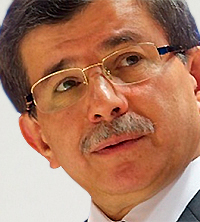
Письмо армянских общественных деятелей премьер-министру Турции Давутоглу
Հայաստանի հասարակական գործիչների նամակը Թուրքիայի վարչապետին
To Mr. Ahmet Davutoglu, Prime Minister of the Republic of Turkey
Dear Mr. Prime Minister,
Nobody can deny that one should “respectfully refer to the memory and conscience of all Ottoman citizens” as one hundred years ago they “shared the joy, sorrow and common fate” and each one has become a victim of that fate in his or her own way. But we – the nowadays generation of the Armenians and the Turks – are first of all united with the fact that “we have common responsibility to cure the wounds of 100 years and to re-establish the lost human bonds”. In this sense we, citizens of Armenia, find it necessary to respond to Your message (http://www.basbakanlik.gov.tr/Forms/_Article/pg_Article.aspx?Id=94b50d52-8d03-4b42-ad15-f8ceba401572) made on the eve of April 24 “in regard of the Ottoman Armenians killed during the fall of the Ottoman Empire”.
100 years ago the mass persecutions realized by the Ottoman government, not only damaged the existence of Armenian people in their long-standing historical motherland but also made the Turkish people a hostage of the charges in the most serious crime against humanity. You announce in Your message that “it is possible to discover those who are guilty and to find out the reasons” but “to lead everything to one word and in general to put all the blame onto the Turkish people only, connecting it with hatred is disputable from legal and moral points of view”.
The embodiment of conscience of a nation is the constitution of the country, so we consider the constitution adapted on December 23, 1876 an important landmark of the Ottoman Empire. According to this political principle, we consider as historical enemies for us – Ottoman citizens, all of those who have despised that constitution and the values it protected, the major one of which was the equality of rights in front of the law for all Ottoman citizens.
We believe that “the mature and honorable attitude” of assessing the value of historical events should give an all-embracing answer to the question which worries us – why the will to live in peace in the common, multinational home of the Ottoman citizens, maintaining their ethnic, spiritual and cultural identity, remained on paper only.
One hundred years after the dramatic incidents which ended the idea of equality of the Ottoman citizens, this issue is still politically actual not only for the generations of the Ottoman Armenian citizens but also for those Turkish people who feel that their valuable human individuality is limited by the existing state system.
It is certainly known to You, as a scientist, what kind of obstacles the ideology of equality of rights of the Ottoman citizens had to face and how many people were deprived of their lives by the enemies of that ideology. So we are sure You will agree that another important landmark of the Ottoman Empire is the unification of political forces in 1908 in their struggle to restore the constitution.
Today we condemn the leaders of Ittihad not only for their racist ideology of the hegemony of the Turkish people over other Ottoman citizens. In January 1913, Ittihad carried out a coup which was expropriation of power from the legal viewpoint, and from moral viewpoint it was treachery of political allies toward the national ideology of equality of all Ottoman citizens.
The inevitability of being punished by the cheated citizens made the illegal authorities find external sponsorship and draw the country into a war. There was no other way, only war could give an opportunity to raise a huge wave of slander against the cheated Ottoman Christian citizens, the purpose of which was to suppress any revolt against the illegal authorities.
We think that all further actions to exterminate all those peoples were only the consequence of the mean choice of Ottoman leaders. It was decided to get rid of the witnesses of treachery – the Christians.
But that was not all, they had to wipe out the memory and conscience of the last witness of the treachery – the Ottoman Turkish citizens. We think You will agree that this part was carried out by the Turkish Republic government by legalizing Turkish nationalism as a state policy, thus inspiring the Turkish citizens that what happened in the country was “heroism for the sake of the nation”. It was the tragedy of Turkish citizens that only one hundred years later they started to realize how dishonorable was the life they led.
This is the today’s problem of the descendants of former Ottoman citizens. No historians are needed here, only conscience and a reasonable and impartial view are enough. The evidence of treachery is in the heart of the people, not in historical documents.
Today the essence of “collision of contradicting memories” for the descendants of Ottoman citizens is conditioned by the different attitudes towards that treachery. So if there is a wish to heal the hundred-year-old wounds and to restore human relationships, then the sense of any conversation between the generations of the Ottoman citizens should lead to a united attitude towards that Great Treachery.
Hopefully, the present generation of the Turkish people perfectly understands it as it is difficult to live in dishonorable conditions forever. It is especially difficult to live when the whole world finds you guilty and offers to repent for your own sake. The choice is up to them, as the other descendants of Ottoman citizens have nothing else to lose.
Manvel Sargsyan, Director of Armenian Center for National and International Studies
Harutyun Karapetyan, Director of National Foundation of Science and Advanced Technologies
Stepan Danielyan, Head of Collaboration for Democracy Centre NGO
Andrias Ghukasyan, Political Scientist
Saro Saroyan, Political Scientist
Vartan Jaloyan, Publicist
27.05.2015, Yerevan, Armenia